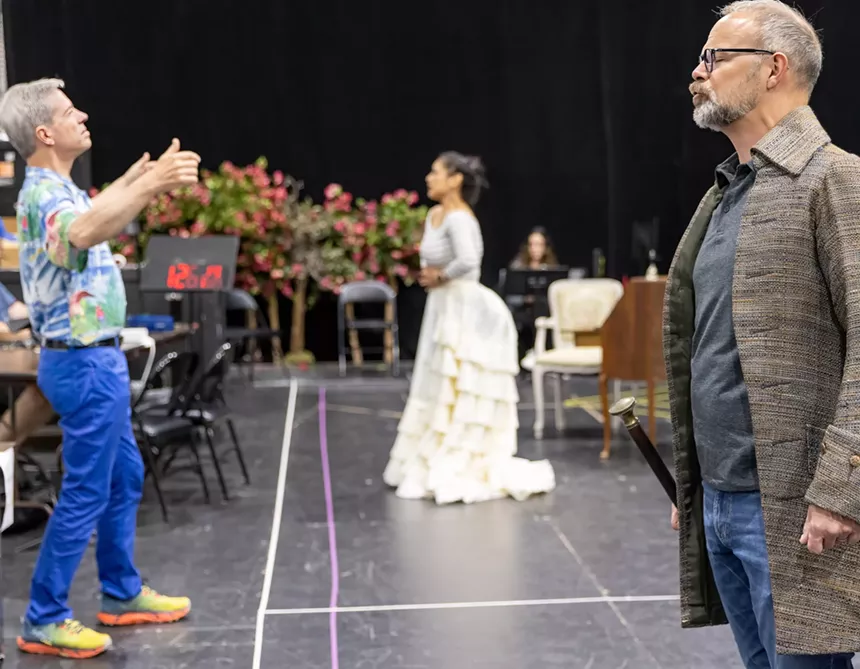When López began studying music in college, she recalls her introduction to the aria "Sempre libera."
"It was so beautiful. I wanted to learn it. And then I saw that the name of the role was Violetta, spelled exactly like mine. It was meant to be."
Destiny arrived years before that, however. The Mexican-American says that the traditional spelling of the name in Mexico is with one "t." But her father decided, while filling out her birth certificate, that his Violetta would be spelled with two.
López performs in Florida Grand Opera's season opener of La Traviata on Saturday, November 11; Sunday, November 12; and Tuesday, November 14, at the Adrienne Arsht Center in Miami, and Thursday, November 30, and Saturday, December 2, at the Broward Center for the Performing Arts in Fort Lauderdale.
It took a long time for the daughter of migrant workers from Michoacán to realize that a career in opera could be possible.
"My parents settled in Idaho. My childhood and adolescence were spent in the fields with my mother and older brother hoeing sugar beets." Yet she was surrounded by music.
"What was taught to me was mariachi and ranchera music. Opera wasn't something that people who 'looked like me' were exposed to. I went through my upbringing loving music, but loving a different genre of music completely," she says.
When she attended the University of Nevada, Las Vegas, she studied music education with the idea of becoming a music teacher. "It seemed the most practical," she admits.

Pavel Petrov, Cecilia Violetta López, and Troy Cook star in the Florida Grand Opera production of La Traviata.
Photo by Eric Joannes
It took some getting used to for her parents to grasp that their daughter was going to be an opera singer. "It wasn't an art form that we knew about or had a taste for," she says. López recalls explaining opera in a way that would make sense to her mother.
"Every opera has a storyline," she told her mother. "It's like a Hispanic novella. There's probably a death in the story, there's comedy, there's romance, there's always some sort of drama happening."
FGO's La Traviata is the 14th production for López, who moved to Albuquerque, New Mexico, during the pandemic after spending 20 years in Las Vegas.
And while she has sung the role of the Parisian courtesan Violetta Valéry more than a dozen times, she says it's always a challenge. "Violetta keeps me on my toes no matter how many times I sing her."
Vocally, it is one of her most demanding roles. The famous Act 1 aria, "Sempre libera" (or "Forever Free") — the one that López wanted to sing even before she knew anything about her namesake – is a massive musical and dramatic feat. "It is my own personal Mount Everest," she admits.
Conductor Joe Illick says when López embarks on her ascent, he'll be right there with her. As an opera conductor, Illick says he works with his orchestra in a way that allows the performers to do what they do best.
"Every performance will be different because there's never the same thing happening on stage — one night, someone is going to want to hold a phrase longer. My job is to give them the feeling that they don't even need to think about it. All they need to do is interact with one another in the most believable way. It's letting the singers express themselves, which to me is what makes opera incredibly powerful."

Maestro Joe Illick conducts Cecilia Violetta López and Troy Cook in rehearsal for Florida Grand Opera's La Traviata.
Photo by Eric Joannes
All opera, he says, is driven by the text, and all the singing is driven by the text. "As an opera conductor, I'm probably at the end of the spectrum of people who really believe it is a work of theater with great music."
Illick returns to FGO for the first time since 1993. He was the former interim artistic director of the Greater Miami Opera, which, after its merger with the Opera Guild of Fort Lauderdale, formed Florida Grand Opera in 1994.
Verdi based his opera on a play by Alexandre Dumas fils, La Dame aux camélias, about the most fashionable courtesan in 19th-century Paris, Marie Duplessis — Dumas was one of her many lovers. Duplessis died of tuberculosis at the age of 23, just five years before Verdi's opera premiered in 1853.
In Verdi's opera, the Parisian courtesan attempts to leave the life she knows to find true love. When she meets a nobleman, Alfredo, they embark on a passionate romance that is put to the test by society's expectations.
"It's a story that I think everyone can relate to — of selflessness, of searching for love, of that conflict of self-worth. Her feelings of whether she is worth being loved," says López. "There's a reason why it has withstood the test of time, and truly, I think it's because of the very human qualities that this story shares."
– Michelle F. Solomon, ArtburstMiami.com
Florida Grand Opera's La Traviata. 7 p.m. Saturday, November 11; 2 p.m. Sunday, November 12; and 8 p.m. Tuesday, November 14, at the Adrienne Arsht Center for the Performing Arts, 1300 Biscayne Blvd., Miami; and 7:30 p.m.Thursday, November 30, and Saturday, December 2, at the Broward Center for the Performing Arts, 201 SW Fifth Ave., Fort Lauderdale; 800-741-1010; fgo.org. Tickets cost $22 to $210.










